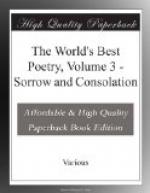See, as I linger here, the sun grows low;
Cool airs are murmuring that the night
is near.
Oh gentle sleeper, from thy grave I go
Consoled though sad, in hope and yet in
fear.
Brief is the time,
I know,
The warfare scarce
begun;
Yet all may win the triumphs thou hast won.
Still flows the fount whose waters strengthened thee;
The victors’ names are yet too few
to fill
Heaven’s mighty roll; the glorious armory,
That ministered to thee, is open still.
WILLIAM CULLEN BRYANT.
THOU ART GONE TO THE GRAVE.
Thou art gone to the grave—but we will
not deplore thee,
Though sorrows and darkness encompass
the tomb;
The Saviour has passed through its portals before
thee,
And the lamp of His love is thy guide
through the gloom.
Thou art gone to the grave—we no longer
behold thee,
Nor tread the rough path of the world
by thy side;
But the wide arms of mercy are spread to enfold thee,
And sinners may hope, since the Sinless
has died.
Thou art gone to the grave—and, its mansion
forsaking,
Perhaps thy tried spirit in doubt lingered
long,
But the sunshine of heaven beamed bright on thy waking,
And the song which thou heard’st
was the seraphim’s song.
Thou art gone to the grave—but ’t
were wrong to deplore thee,
When God was thy ransom, thy guardian,
thy guide;
He gave thee, and took thee, and soon will restore
thee,
Where death hath no sting, since the Saviour
hath died.
REGINALD HEBER.
LYCIDAS.
Yet once more, O ye laurels, and once more
Ye myrtles brown, with ivy never sere,
I come to pluck your berries harsh and crude
And with forced fingers rude
Shatter your leaves before the mellowing year,
Bitter constraint, and sad occasion dear,
Compels me to disturb your season due;
For Lycidas is dead, dead ere his prime,
Young Lycidas, and hath not left his peer.
Who would not sing for Lycidas? He knew
Himself to sing, and build the lofty rhyme.
He must not float upon his watery bier
Unwept, and welter to the parching wind,
Without the meed of some melodious tear.
Begin then, sisters of the sacred well,
That from beneath the seat of Jove doth spring,
Begin, and somewhat loudly sweep the string.
Hence with denial vain, and coy excuse;
So may some gentle muse
With lucky words favor my destined urn,
And as he passes turn,
And bid fair peace be to my sable shroud;
For we were nursed upon the self-same hill,
Fed the same flock by fountain, shade, and rill.
Together both, ere the high lawns appeared
Under the opening eyelids of the morn,
We drove a-field, and both together heard
What time the gray-fly winds her sultry horn,
Battening our flocks with the fresh dews of night,




